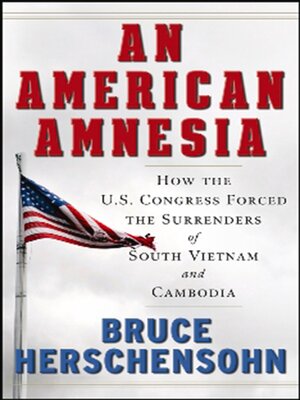An American Amnesia
ebook ∣ How the US Congress Forced the Surrenders of South Vietnam and Cambodia
By Bruce Herschensohn

Sign up to save your library
With an OverDrive account, you can save your favorite libraries for at-a-glance information about availability. Find out more about OverDrive accounts.
Find this title in Libby, the library reading app by OverDrive.



Search for a digital library with this title
Title found at these libraries:
| Library Name | Distance |
|---|---|
| Loading... |
January 27th, 1973: the United States, South Vietnam, North Vietnam, and the Viet Cong sign the Paris Peace Accords, guaranteeing the right of self-determination to the South Vietnamese people. April 30th, 1975: President Duong Van Minh of South Vietnam announces the nation's unconditional surrender to the North, ending the decade-long conflict and enabling the merger of both countries into the Socialist Republic of Vietnam. What happened in two short years to cause such a dramatic reversal?
In An American Amnesia, respected political commentator Bruce Herschensohn re-examines the incredible actions taken by the 94th Congress and by many American citizens which forced South Vietnam's surrender, an event that brought about immense tragedy for Southeast Asians and haunts our political landscape to this day. Drawing on notes, speeches, and writings from his own experiences in Southeast Asia, as well as in the United States Information Agency and in the White House, Herschensohn fills in important facts in that period of history and warns against the danger of succumbing to a similar voluntary amnesia in the future.
In An American Amnesia, respected political commentator Bruce Herschensohn re-examines the incredible actions taken by the 94th Congress and by many American citizens which forced South Vietnam's surrender, an event that brought about immense tragedy for Southeast Asians and haunts our political landscape to this day. Drawing on notes, speeches, and writings from his own experiences in Southeast Asia, as well as in the United States Information Agency and in the White House, Herschensohn fills in important facts in that period of history and warns against the danger of succumbing to a similar voluntary amnesia in the future.







